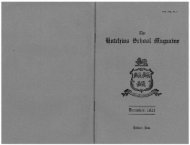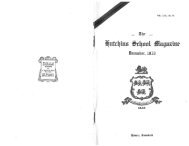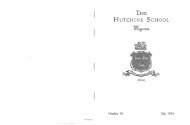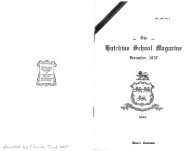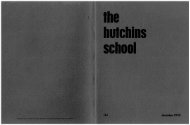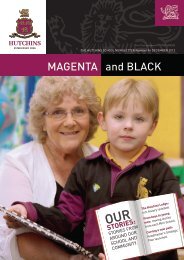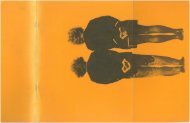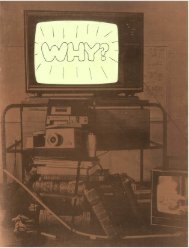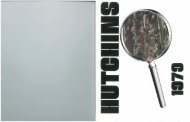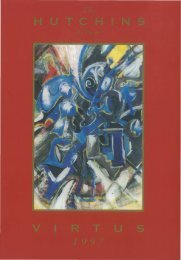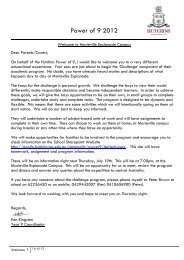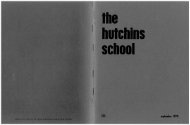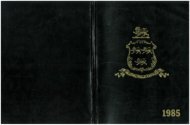The Hutchins School Information for Parents 2011.pdf
The Hutchins School Information for Parents 2011.pdf
The Hutchins School Information for Parents 2011.pdf
- No tags were found...
You also want an ePaper? Increase the reach of your titles
YUMPU automatically turns print PDFs into web optimized ePapers that Google loves.
Work or behaviour which reflects poorly on the student receivesa carefully considered response, from a quiet word to a chat, anote in the Diary or a ‘T’. A ‘T’ stands <strong>for</strong> ‘Take Care’. Wherenecessary, a student will be referred to the Year Head whomay keep a student back to undertake extra work. In unusualcircumstances, a Saturday detention may be imposed to remind astudent of the need to get back on track.HOMEWORKHomework is part of the teaching and learning process and itsvalue is continually rein<strong>for</strong>ced with the students.It significantly extends the time spent on individual subjects,involves and in<strong>for</strong>ms parents, makes subsequent lessons moremeaningful and useful, allows time to reflect on the work,develops the habit of working without teacher supervision andallows research which cannot easily be done in class.Middle <strong>School</strong> students are required to complete sixty to ninetyminutes of homework from Monday to Friday. If your son isregularly spending significantly less or more time than this, pleasespeak with his Mentor as it may indicate a need to gear the setwork more closely to his needs.To ensure adequate coverage of all areas of study during the week,students receive a homework timetable at the start of the year.This timetable appears near the front of the Diary, following thedaily lesson timetable.Homework is entered in the Diary at the end of each lesson, andstudents are taught to refer to their diaries be<strong>for</strong>e leaving school toensure they take the necessary books home. <strong>Parents</strong> are asked totake an active interest in their son's homework.Homework is usually checked in the following lesson, using avariety of means.LATENESS AND ABSENCE<strong>The</strong> Middle <strong>School</strong> is open from 8.10 am, and students are to beat their lockers preparing <strong>for</strong> the first lessons at 8.25 am. Studentsarriving after 8.30 am go directly to the Late Book outside theMiddle <strong>School</strong> Secretary’s Office and fill in the details.If a student is going to be late or absent, parents are asked totelephone Mrs Beadle, Middle <strong>School</strong> Secretary, by 9.00 am on6221 4264.LEADERSHIP<strong>The</strong> Middle <strong>School</strong> has a Student Council drawn from studentsof both year groups who have undertaken an intensive leadershiptraining program and who have demonstrated a commitment toworking as leaders with other students.Much of the leadership training, which is available to all Middle<strong>School</strong> students, is geared towards assisting with runninglunchtime activities <strong>for</strong> Middle <strong>School</strong> students or working withthe ELC students. Students are recognised <strong>for</strong> their contributionsat three levels of leadership. Level one leaders from the Middle<strong>School</strong> Leadership Team who meet weekly and run assemblies,publish newsletters, plan and manage community serviceactivities, and undertake special assignments. Students who reachLevel 2 leadership are considered <strong>for</strong> Middle <strong>School</strong> Councilmembership as the third level.<strong>The</strong> Middle <strong>School</strong> has a broad commitment to fosteringleadership and service in all students, and staff take everyopportunity to link students to useful tasks, great and small,from which they can gain experience. Mentor groups typicallyfind eight or ten roles <strong>for</strong> students each term, roles which rotateamongst students through the year.LOCKERSEach student is allocated a locker which holds books and someclothing such as his blazer. In addition, he has space <strong>for</strong> a bag ona rack near his locker. Students are expected to keep their lockerstidy and locked.Most Year 7 lockers require a key <strong>for</strong> which accounts will becharged $7.00, refundable in cash at the end of the year when thekey is returned. If the key is lost or damaged, a new one needsto be ordered <strong>for</strong> an additional $7.00 through the Year Head. <strong>The</strong>Year Head has a master key <strong>for</strong> those occasions when a studentmisplaces or <strong>for</strong>gets his key.Year 8 lockers, some of which may be available <strong>for</strong> Year 7, requirea combination padlock which is purchased through the <strong>School</strong>Uni<strong>for</strong>m Store. This money is to be brought on the first day ofTerm 1. At the end of the year, the lock may be kept <strong>for</strong> personaluse. Only these locks may be used, as they take a master key <strong>for</strong>emergency access.LOST PROPERTY AND BELONGINGS<strong>Parents</strong> are urged to ensure that all belongings including socksand shoes are clearly named. Belongings found lying around arerestored to the owner with a reminder about taking care. Unnamedbelongings are kept in a designated room and students may ask tocheck the contents if they find they are missing something.Sometimes, unnamed belongings can find their way into similarcupboards in Junior or Senior <strong>School</strong>, and students looking <strong>for</strong>their belongings may have to check those two areas also. In Junior<strong>School</strong>, the cupboard is kept by Mrs Priest, and in Senior <strong>School</strong> itis located outside the <strong>School</strong> House office.5 - Middle <strong>School</strong> 29



